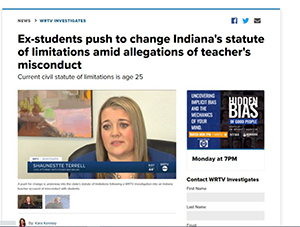By: Amina A. Thomas, Attorney The New York Times’ Monday morning headline this week was a report on How Rape Cases Get Dropped. The article ... Read More
statute of limitations
Sexual Abuse in Indiana Schools
VIDEO: A discussion with attorney Shaunestte Terrell Talk with Shaunestte Learn more about how Cohen & Malad, LLP's sexual abuse litigation ... Read More
Sexual Assault Statutes of Limitations: Archaic, Arbitrary, Absurd Deadlines
By: Shaunestte Terrell, Attorney Anyone who’s ever taken in an episode of Law & Order (or even Night Court back in the day) has heard that ... Read More
Filing Deadlines Vary for Boy Scout Sexual Abuse Claims
**UPDATE NOVEMBER 2020** The deadline for filing claims against the BSA expired on November 16,2020 @ 5:00 EST. Cohen & Malad, LLP is no longer ... Read More
The Statute of Limitations: How Inaction Can Kill Your Personal Injury Lawsuit
by: Edward B. Mulligan V , Attorney As a lawyer who represents personal injury victims, I can tell you that each case--even the very best--must face ... Read More
Medical Malpractice and Adoption
by: David J. Cutshaw, Attorney In an interesting case, the Indiana Court of Appeals recently ruled that adoptive parents could proceed with a medical ... Read More






